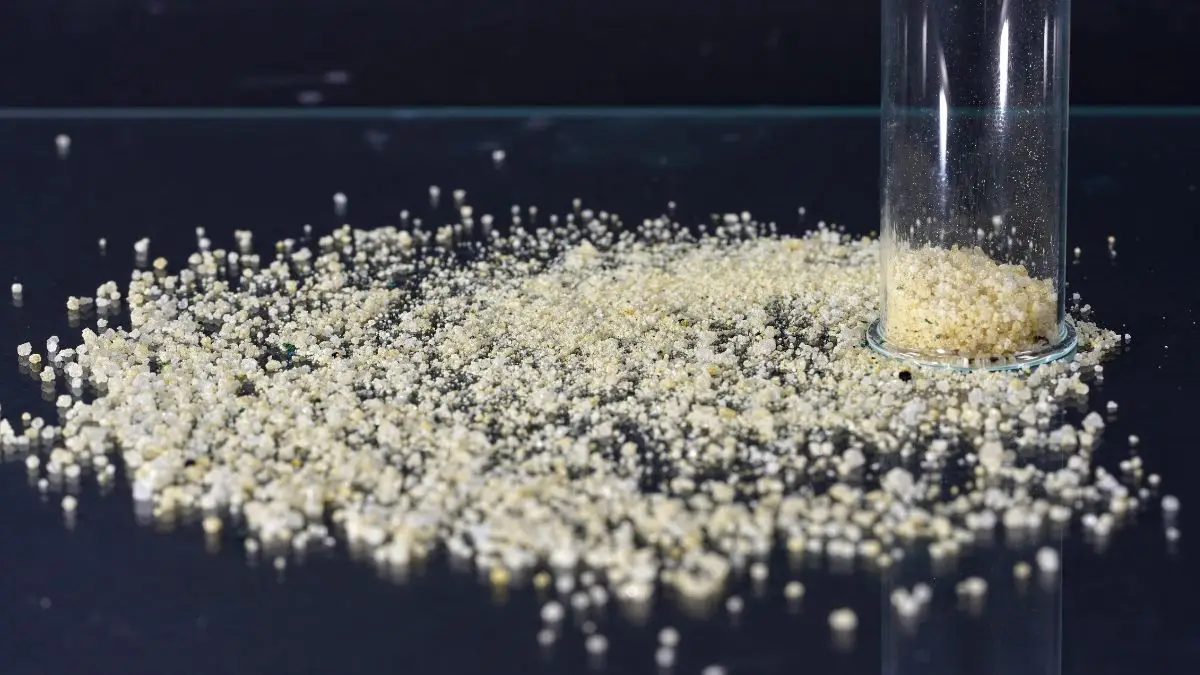Answer: Yes. Calcium sulfate, also known as gypsum, is a vegan food additive widely used in the brewing and baking industries for various purposes.

If you enjoy an extra tinge of bitterness in your beer, adding gypsum to it could be the right option. However, you might wonder if this ingredient can be added to other foods. Is calcium sulfate vegan? The answer is yes, Gypsum can be conveniently used as a vegan source of calcium in canned foods, wheat flour, bread, blue cheese, and other varieties. Scroll down the page to learn more about this excellent add-on substance.
Table of Contents
What Is Calcium Sulfate or Gypsum?
Calcium sulfate (CaSO4) is the naturally existing salt of calcium, and its dihydrated form (CaSO4. 2H2O) is called ”gypsum,” which is a white or transparent powder. The largest gypsum deposits are in the USA, producing around 20 million metric tons.
In contrast, Iran and China are next down the line with a production quantity accounting for 16 million metric tons of gypsum. If you are interested in fixing your wall plasters or need to build models for your science exhibition, Calcium sulfate could be your number one choice.
It is because when gypsum is heated beyond 120°C, it crystallizes into white-colored Plaster of Paris that, when mixed with water, could be molded into various shapes. The history of this unique product of gypsum dated back to 975 A.D and was first discovered by a Persian pharmacist, Abu Mansur Muwaffaq.
Interestingly, you can use gypsum for various purposes due to its pH-lowering properties. It includes improving the soil’s quality and moisture receptivity.
It is the main ingredient of the building material used to construct the Egyptian pyramids. Due to its withstanding strength for several years, gypsum is a highly durable mineral. Being extremely fire-resistant, coating walls and ceilings with gypsum, also termed drywall, can protect houses from fire. Since gypsum is a hydrated mineral, it doesn’t heat until 212°F, and in the event of a fire, the water evaporates as steam, leaving the drywall without harm at this temperature.
Due to its remarkable strength and thickening properties, gypsum is widely used in sidewalk construction. Apart from this, next time you brush your teeth or use shampoo, you can think of gypsum as a non-toxic compound in these products due to its excellent binding properties.
Why Is Calcium Sulfate Vegan?
Since calcium sulfate is found as a natural mineral in the soil, both in anhydrous and hydrated (gypsum) forms, this chemical is 100% vegan in nature. Gypsum is the best vegan alternative to bone ash and is widely used as an anti-caking agent by the confectionery and baking industry.
Similarly, a drying agent, food stabilizer and thickener, color additive, and dough-firming agent can be used. Your delicious bite of slightly sweet and tender tofu is a product of the effective coagulation of soy milk using gypsum that generates high curd peaks, giving tofu its unique texture and flavor. Likewise, food products with a longer shelf-life, such as beverages, ice creams, jellies, and pasta, are mixed with gypsum as a natural vegan food preservative. Gypsum is a great vegan source of calcium.
Gypsum: A Gem for the Brewing Industry
Are you someone with an entrepreneurial mindset planning to introduce a distinctive niche in the brewing industry? If yes, look no further and get your hands on manipulating gypsum concentrations to develop beer flavors with variable bitterness nuances.
Adding gypsum to the mash tends to lower the brewing water’s pH, reducing the wort’s sweetness and heightening the beer’s bitterness. However, it is essential to be familiar with the water’s mineral composition to achieve the desirable pH in your mash.
The hardness of water is governed by certain minerals such as calcium, magnesium, carbonate, bicarbonate, and sulfate ions. If the water has a low sulfate concentration, adding 7-8 grams of gypsum to 5 gallons of the mash batch shall do the needful. Usually, gypsum aids calcium ions to react and combine with sulfate ions that acidify the mash maintaining its pH between 5.1-5.4. This, in turn, assists in effective yeast fermentation of the mash. Yet, adding only gypsum and other salts may not always be enough to acquire the preferred pH levels, and for that, you may have to make use of certain acids, such as lactic acid or phosphoric acids.
Nonetheless, being a vegan, you must be mindful that these acids are yielded from plant sources rather than fermented dairy and meats.
Other additional benefits of gypsum include efficient malt extraction through the rapid breakdown of sugars, maintaining a subtle balance of bitterness with the wort’s sweetness, upgrading wort clarity, and separating phosphates and proteins in the wort sludge. Read further to obtain further knowledge regarding your favorite beer flavors.
Burton-Snatch
The story behind this beer flavor dates back to the 19th century. It was named as per the location, Burton-on-Trent in England, from where it had originated. This beer flavor is known to have a high content of sulfate in the mash and wort, imparting a typical smell of hydrogen sulfide, resembling rotten eggs’ stench. The well water brewing in that area was high in sulfates, giving off a guff when the beer was poured.
Magic of Gypsum in Hoppy Beers
You might wonder what exactly makes beers hoppy. Such beers are characterized by the indulgence of hops (flowers or cones) that contribute an earthy, flowery, or citrusy taste and smell to these beers.
Additionally, hops are known to have a bitter flavor, and believe it or not; these are in almost every type of beer. Without incorporating hops, your beer shall taste utterly sweet, which is unlikely to be the expectation. So, hops gauge the right balance between the sweetness and bitterness in your beer.
Usually, the beer’s distinctive aroma and taste depend on the quantity, type, and time of hops during the brewing process. Adding hops while boiling the wort accentuates the bitterness of the beer. Adding those at the end of the boil adds a massive aroma to the finished product, not always the bitterness. Despite this, maintaining a balance between chloride and sulfate ions is essential in the brewing water for the type of beer made. Here comes the magic of gypsum that not only acts as a source of sulfate ions but overcomes any stern flavors.
Is Calcium Sulfate Safe for Human Consumption?
The food-grade gypsum is acknowledged as entirely safe for human consumption by the U.S. Food and Drug Administration (FDA). Furthermore, the European Food Safety Authority (EFSA) has confirmed no health concerns concerning calcium sulfate intake in food supplements, provided its quantity doesn’t exceed 2500mg per day for an adult. Gypsum constitutes 23 to 29% calcium and can supplement calcium deficiency to prevent osteoporosis and other bone defects.
If you exceed the recommended calcium sulfate dose, you will likely suffer from mild side effects such as gas, bloating, and constipation. To counter these symptoms, you may divide your dose into intervals and consume the supplement with food.
An overdose may lead to calcium sulfate toxicity characterized by nausea, vomiting, fatigue, high blood pressure, mental instability, and coma in exceptional circumstances.
Famous Gypsum Brands
Whether you are looking to purchase food-grade gypsum for your home-brewing, tofu-making, or baking purposes, it is imperative to know how famous gypsum brands are easily accessible.
One of these options is LD Carlson 6106B Calcium Sulfate (Gypsum), available in a 1lb (464g) packet. The other best product is The Tofu Box, which is 100g gypsum. Finally, the most popular gypsum used for home brewing is Young’s Gypsum – Calcium Sulphate (Young’s Gypsum), sold in a 100g tub. All these items can be easily purchased online and are quite famous in the vegan community.

